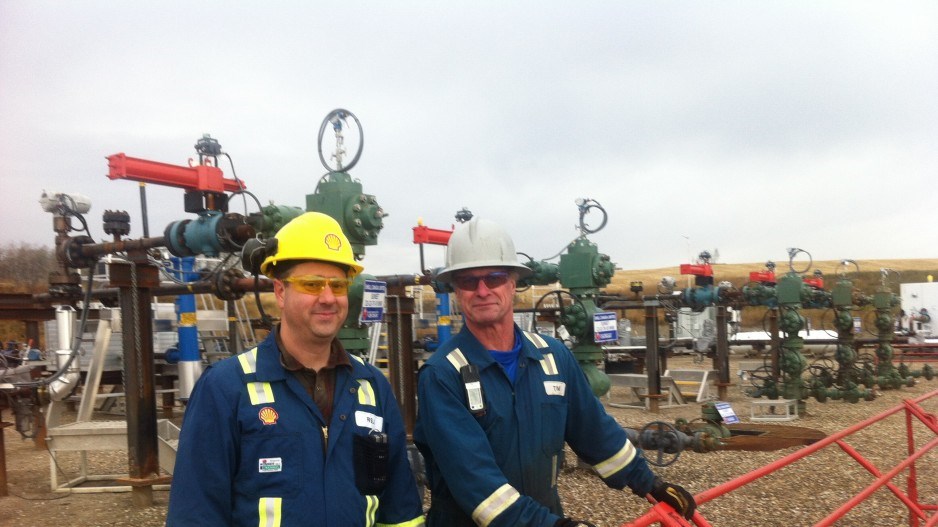Royalties and tax credits for B.C.’s oil and gas industry are outdated, piecemeal, complex, and don’t provide the societal benefits that they should, according to an independent assessment by two public policy and energy experts commissioned by the B.C. government to review its oil and gas royalty structure.
But rather than try to tinker with the system – simply eliminating B.C.'s controversial deep well credit, for example – the assessment suggests a complete overhaul of the way the natural gas industry is taxed, and points to Alberta’s revised system as an example worth considering.
The assessment, released today, was conducted by two noted academics – Nancy Olewiler, a public policy professor at Simon Fraser University, and Jennifer Winter, associate professor of economics and scientific director of the energy and environmental policy research at the University of Calgary.
Their assessment will form the foundation for a public review of B.C.’s royalty and tax structure oil and gas that B.C.’s ministry of Energy, Mines and Low Carbon Innovation has launched.
"The review process we are launching will allow the public to have their say on a new, modernized royalty system that meets our goals for sustainable economic development,” said Energy Minister Bruce Ralston.
Anti-fossil fuel activists and the Green Party have long criticized B.C.’s “fracked gas” for being subsidized by the B.C. government. B.C.’s deep well credits have been particularly singled out, and have been blamed for the declines in revenue that the government has received from natural gas producers over the last decade.
In fact, declining natural gas royalties have largely been the result of declining natural gas prices – which only recently have begun to soar – although the assessment does suggest that the B.C. government is not getting full value from its royalty structure.
Olewiler’s and Winter’s assessment concludes B.C.’s royalty system for oil and gas is out-of-date and may be incentivizing “lower-value wells” that are not maximizing value, either for the companies or the government.
“It may incentivize companies to drill to access the credit rather than to minimize costs and maximize revenue,” the assessment says.
The deep well credit program was implemented in 2003, when horizontal drilling and hydraulic fracturing were still relatively new alternatives to conventional drilling. They were intended to offset costs of drilling and completion for wells that were very deep and, therefore, more capital intensive.
“As of March 2021, the accumulated deep well credits total $7.325 billion,” the assessment finds. “Of that, $3.56 billion have been drawn down.”
In other words, only half the credits approved have been claimed. The credits reduce the royalties the B.C. government receives by 3% to 6%.
Whereas deep horizontal drilling was an “unconventional” approach to natural gas extraction when the credits were introduced, it is now a standard approach in B.C., which raises the question of whether the incentives are even needed any longer.
But deep well credits aren’t the only tax incentives offered, and the assessment suggests the whole system could benefit from a do-over.
“All of the royalty deduction programs are out of date,” the assessment notes. “They were introduced at a time with more favourable product prices, and do not take into account changing extraction technology and shift to natural gas liquids in the product mix and investment profile.”
“The system is characterized by piecemeal changes over time with programs that have led to compounding effects that substantially reduced royalty payments as a share of net value of the resource.”
The most productive region in B.C. for oil and gas is the Montney formation, which straddles the B.C.-Alberta border. The assessment suggests that, as part of a review of B.C.’s system, it could take a page from Albert’as playbook.
“Alberta undertook a major reform of its oil and gas royalty system, phasing in its new system in 2017,” the assessment notes. “Given the Montney’s shale deposits straddle the BC-Alberta border, moving to a system such as Alberta’s would better align production, reduce any incentive to shift production from one province to the other to minimize royalty payments, and overall promote a more efficient and equitable system.”
The Olewiler-Winter assessment will form the basis of a discussion paper that Ralston’s ministry plans to release in November, which will then be opened to a public consultation process.
The government plans to release the findings of its review in February.




